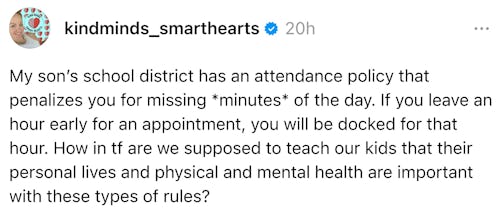
I remember one of the most coveted awards at the “End Of School” banquets was The Perfect Attendance Award. Some kids made it their main mission to not miss one minute of class. That means no sick days, no missing class for a doctor’s appointment, that means no playing hooky at all. For me, that means no fun, but hey, to each their own.
My daughter is a month into Kindergarten and has already been home three days because of illness so that dream is out the window for her. Plus, I will surely take her out of school for some fun days and mental health days. She’s five years old, after all! She doesn’t need the pressure of attendance on her shoulders.
And while this is how I plan to parent her, that doesn’t seem to be the way schools would like me to do it. Most schools have attendance policies. If you miss a certain amount of days, the school or district will send a concerned email, noting how important being in the classroom is for a student’s learning experience. And yes, missing tons of school is not great for anyone, but where is the line?
One mom wonders if her son’s school district has gone too far after docking him for literally missing minutes of school.
On Threads, mom, teacher, and author, Jackie Sullivan, asked her followers if she was in the wrong for thinking that this was totally out of line.

“My son’s school district has an attendance policy that penalizes you for missing *minutes* of the day. If you leave an hour early for an appointment, you will be docked for that hour. How in tf are we supposed to teach our kids that their personal lives and physical and mental health are important with these types of rules?” she asked.
After her post took off, several other parents threw their thoughts into the ring, noting that this kind of attendance policy didn’t seem normal.
“So ridiculous. My kids’ school is doing this attendance “challenge” thing for September. It’s dumb. Kids get sick. Doctor and dentist appointment happen,” one user said.
Others noted that the attendance pressure could have to do with school funding.
“In my state school funding is tied to attendance. I’m betting your child’s school doesn’t want to promote a toxic work culture they are just underfunded and trying to maximize any monies they can get from the state,” one user wrote.
“I’m a former teacher and yes. It’s definitely tied to funding. I guess my point is, it shouldn’t be,” the OP replied.
“It’s setting them up for the corporate world,” another wrote.
One user asked, “What is their punishment for being docked? This is so ridiculous!”
“I’m not entirely sure but they tally the minutes, hours, and days up and there are potential court situations. 🤷♀️,” the OP said.
One user chimed in, “I’ve heard of schools who enter all children with attendance above a certain amount (say 90%) into a prize draw and one (or a few) names are picked for a little prize (e.g. a gift voucher). I don’t mind that AS much because it isn’t all high-attendance kids getting something. But I hate it when there’s a hard cut-off that makes a very obvious us vs them AND the high attenders all get a massive prize/treat. It’s so distasteful.”
First, these parents are correct. School funding is tied to attendance. The ADA (Average Daily Attendance) is a crucial factor in school funding, as it directly links student attendance to financial resources and impacts educational programs and services. Some states and school districts use funding formulas that consider their ADA. This means that schools lose a portion of their funding for each day a student is absent. Thus the big pushes for high attendance numbers.
So, does school attendance really matter? For the most part, yes!
A 2007 study looking at young children found that absenteeism in kindergarten was associated with negative first-grade outcomes such as greater absenteeism in subsequent years and lower achievement in reading, math, and general knowledge. For older kids, high school dropouts have been found to exhibit a history of negative behaviors, including high levels of absenteeism throughout their childhood, at higher rates than high school graduates.
Disclaimer: This story has not been edited by us and is published as shown on Scary Mommy.


Leave a Reply